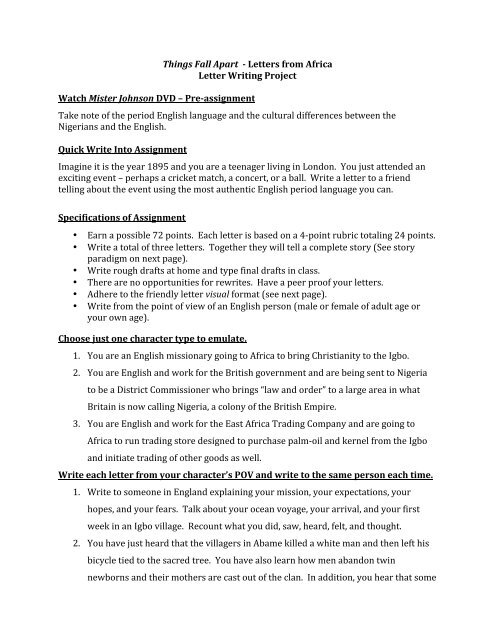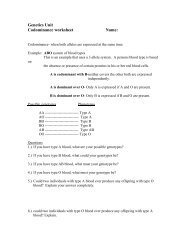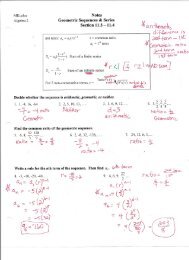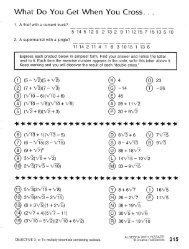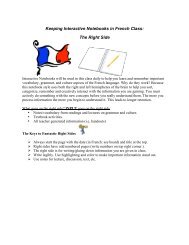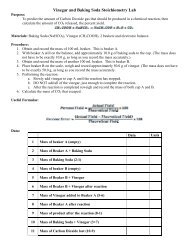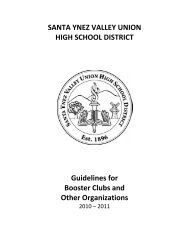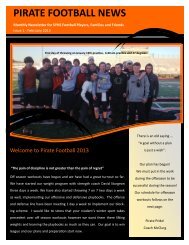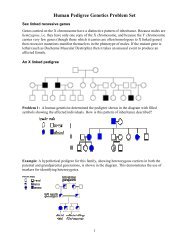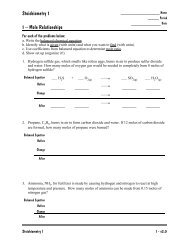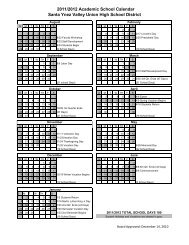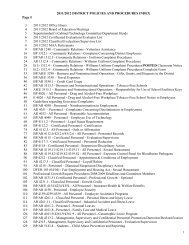Things Fall Apart -â Letters from Africa Letter Writing Project Watch
Things Fall Apart -â Letters from Africa Letter Writing Project Watch
Things Fall Apart -â Letters from Africa Letter Writing Project Watch
Create successful ePaper yourself
Turn your PDF publications into a flip-book with our unique Google optimized e-Paper software.
<strong>Things</strong> <strong>Fall</strong> <strong>Apart</strong> -‐ <strong><strong>Letter</strong>s</strong> <strong>from</strong> <strong>Africa</strong> <br />
<strong>Letter</strong> <strong>Writing</strong> <strong>Project</strong> <br />
<strong>Watch</strong> Mister Johnson DVD – Pre-‐assignment <br />
Take note of the period English language and the cultural differences between the <br />
Nigerians and the English. <br />
Quick Write Into Assignment <br />
Imagine it is the year 1895 and you are a teenager living in London. You just attended an <br />
exciting event – perhaps a cricket match, a concert, or a ball. Write a letter to a friend <br />
telling about the event using the most authentic English period language you can. <br />
Specifications of Assignment <br />
• Earn a possible 72 points. Each letter is based on a 4-‐point rubric totaling 24 points. <br />
• Write a total of three letters. Together they will tell a complete story (See story <br />
paradigm on next page). <br />
• Write rough drafts at home and type final drafts in class. <br />
• There are no opportunities for rewrites. Have a peer proof your letters. <br />
• Adhere to the friendly letter visual format (see next page). <br />
• Write <strong>from</strong> the point of view of an English person (male or female of adult age or <br />
your own age). <br />
Choose just one character type to emulate. <br />
1. You are an English missionary going to <strong>Africa</strong> to bring Christianity to the Igbo. <br />
2. You are English and work for the British government and are being sent to Nigeria <br />
to be a District Commissioner who brings “law and order” to a large area in what <br />
Britain is now calling Nigeria, a colony of the British Empire. <br />
3. You are English and work for the East <strong>Africa</strong> Trading Company and are going to <br />
<strong>Africa</strong> to run trading store designed to purchase palm-‐oil and kernel <strong>from</strong> the Igbo <br />
and initiate trading of other goods as well. <br />
Write each letter <strong>from</strong> your character’s POV and write to the same person each time. <br />
1. Write to someone in England explaining your mission, your expectations, your <br />
hopes, and your fears. Talk about your ocean voyage, your arrival, and your first <br />
week in an Igbo village. Recount what you did, saw, heard, felt, and thought. <br />
2. You have just heard that the villagers in Abame killed a white man and then left his <br />
bicycle tied to the sacred tree. You have also learn how men abandon twin <br />
newborns and their mothers are cast out of the clan. In addition, you hear that some
of the men of the village carried out a sacrifice decreed by the oracle. They young <br />
man was given to the clan as a tribute for a crime committed. What do you think, <br />
feel, and wonder about this What if anything, will you do about it <br />
3. Write about any event of your choice that occurs in Part 3 of the novel. And write <br />
about the events in the last two chapters of the novel. Explain <strong>from</strong> your character’s <br />
point of view what happened. Conclude with what you plan to do next. <br />
Story Paradigm – exposition (setting, mood, tone, hint of conflict, characters); inciting <br />
incident; rising action; climax; falling action; resolution <br />
Character Arc – a change a character undergoes <strong>from</strong> an experience, usu. growth/awareness
Name_______________________________________ <br />
<strong><strong>Letter</strong>s</strong> From <strong>Africa</strong> 4-‐point Rubric <br />
<strong>Letter</strong> 1 <br />
_________Proper friendly letter format <br />
_________Mechanics of English (punctuation, grammar, usage and spelling) <br />
_________Vocabulary/diction, organization of information, and language expression <br />
_________Accurate detail <strong>from</strong> the novel <br />
_________Body paragraphs, salutation, and closing <br />
_________*<strong>Letter</strong> adheres to story paradigm (see below) <br />
_________Total (Possible 24/letter and 72 for assignment) <br />
<strong>Letter</strong> 2 <br />
_________Proper friendly letter format <br />
_________Mechanics of English (punctuation, grammar, usage and spelling) <br />
_________Vocabulary/diction, organization of information, and language expression <br />
_________Accurate detail <strong>from</strong> the novel <br />
_________Body paragraphs, salutation, and closing <br />
_________*<strong>Letter</strong> adheres to story paradigm (see below) <br />
_________Total (Possible 24/letter and 72 for assignment) <br />
<strong>Letter</strong> 3 <br />
_________Proper friendly letter format <br />
_________Mechanics of English (punctuation, grammar, usage and spelling) <br />
_________Vocabulary/diction, organization of information, and language expression <br />
_________Accurate detail <strong>from</strong> the novel <br />
_________Body paragraphs, salutation, and closing <br />
_________*<strong>Letter</strong> adheres to story paradigm (see below) <br />
_________Total (Possible 24/letter and 72 for assignment) <br />
_________Total for <strong>Project</strong> <br />
*First letter – exposition <br />
Second letter – inciting incident and rising action <br />
Third letter – climax and resolution
Some Basic Tips on <strong>Writing</strong> <br />
Two letter spaces are needed after a period. Only in journalism do you use one letter <br />
space to save space. Select the paragraph symbol on the toolbar to show all nonprinting <br />
characters. <br />
A comma splice is when you take two sentences and combine them by using a comma. It <br />
is basically a run-‐on sentence. <br />
Express yourself. Really dig deep to discover your emotions on a topic and then articulate <br />
those feeling in words. <br />
A Run-‐on sentence is two sentences back to back without needed punctuation. <br />
A Homophone error is when you misspell a word that sounds like another word: your, <br />
you’re; whether, weather; to, too, two <br />
Redundancy is when you repeat information previously given. It is not necessary. <br />
Repetition can be used creatively as a device; know the difference between the two. <br />
A sentence may be unclear to the reader if there are missing words, misplaced modifiers, <br />
or awkward syntax. Make sure you say what you mean as well as mean what you say. <br />
Diction or word choice is key in writing. Choose the best words to express your ideas. <br />
Varying your diction. Avoid using the same word more than once. Explore and expand <br />
your use of vocabulary. <strong>Writing</strong> is the perfect opportunity for this. <br />
Transitional words or phrases help create a smooth link <strong>from</strong> one idea to the next and <br />
<strong>from</strong> one paragraph to the next. <br />
Parallelism or parallel structure is necessary when combining several related ideas in <br />
one sentence. This is achieved by using the same form or part of speech to express each <br />
idea. <br />
Incorrect: <br />
I am not much of an athlete, but I like softball, soccer, and playing hockey. [two <br />
nouns and a gerund phrase] <br />
Correct: <br />
I am not much of an athlete, but I like softball, soccer, and hockey <br />
[three nouns] <br />
Combine sentences to avoid choppy sounding paragraphs. And vary sentence length by <br />
using both complex and simple sentences. <br />
Formal/professional language is used most often for letters, essays, and reports. <br />
A non sequitur is when a sentence doesn’t logically follow the previous one. Avoid this.


